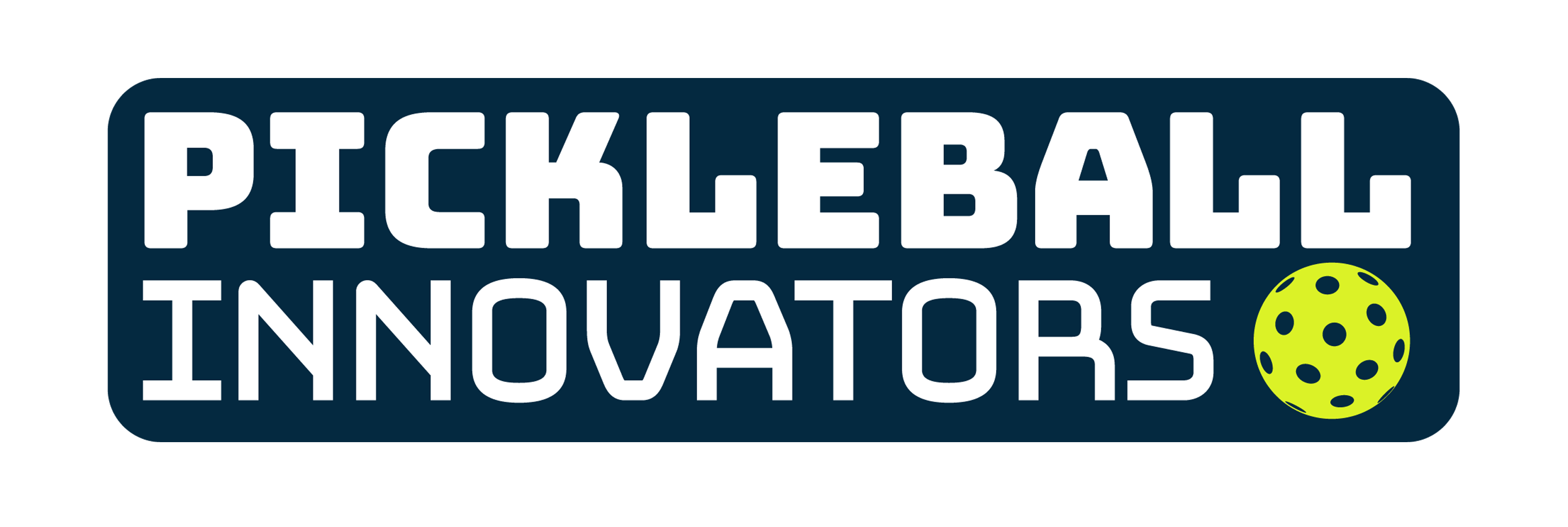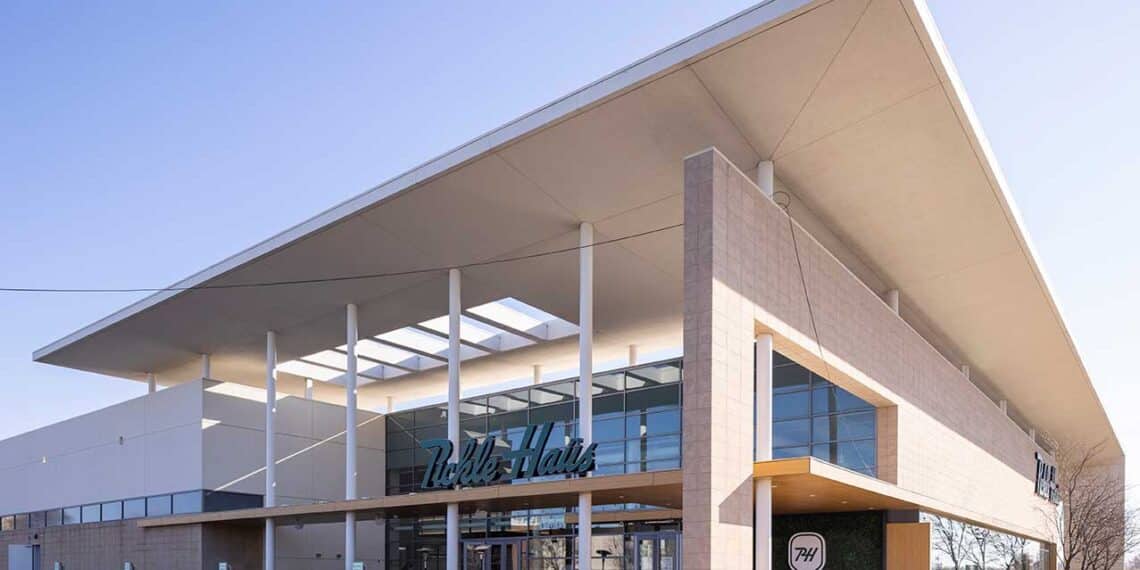Pickle Haus is a pickleball-focused “eatertainment” venue located in Algonquin, Illinois, a suburb of Chicago. In just nine months, the brand has become a local favorite for pickleball, dining and unique social experiences. The facility boasts 12 indoor pickleball courts, a restaurant, bar, two golf simulators, private event space and an outdoor dining patio.
Benj Ecker, a co-founder of Pickle Haus, explained the idea for the company emerged from his and his partner Jeff VanDixhorn‘s deep experience in the tennis and health club industry. Initially, they explored offering pickleball at their tennis clubs about eight years ago, but the financial viability wasn’t there. However, as the popularity of pickleball grew, they revisited the idea.
The actual launch of Pickle Haus came about when VanDixhorn and Ecker were approached by Chicago area developer Hubbard Street Group, which had a former furniture store in Algonquin they thought might be a good space for the pickleball trend they had been seeing in the commercial real estate market. Although VanDixhorn and Ecker were skeptical due to the building’s columns, they discovered the dimensions were perfect for pickleball courts. This led to a joint venture and the successful launch of Pickle Haus in November 2023.
In this Q&A, Ecker shares about Pickle Haus’ initial success, key differentiators, advice for other pickleball operators, and more.
What’s been the response so far from the community, players and customers of Pickle Haus?
Lots of excitement. We opened in mid-November to full courts and full events, and the holiday season was jam-packed. We had a bunch of holiday parties and corporate events right off the bat, and people wanting to come out and see what Pickle Haus was all about. Prior to our project, the No. 1 request from local residents was that they get more pickleball courts. So, this filled a need in the area, and people have been just over the moon. It’s a striking, beautiful building. We had a lot of great help in putting this together in terms of design. It’s a beautiful space, and we really went to great lengths to make it a place where people would come in and say, “Wow, I want to come back here again.”
Would you advise other operators to really focus on their facility design and not overlook that for the sake of getting a facility open?
It depends on what their goals are and what their business model is. I recently read an article about the franchising model in pickleball and how that’s taking off, and they divided the industry into two different business models, which I think is helpful. They said there’s more of a court-focused business model and more of an entertainment business model. With more of a court-focused business model, you get courts open, get people in there and playing. You can do that more cheaply, the barrier to entry is lower, and you’re not going spend money on bells and whistles, such as getting a liquor license and all that stuff.
We went to the other end of the spectrum with ours and have really embraced more of an entertainment business model. We want to be a social gathering for people, and that requires larger investment in terms of capital that goes into design. Bars and restaurants are not cheap to build and operate, but we believe that is necessary for the kind of experience we want for people that come to Pickle Haus.
I think that’s a helpful dichotomy to describe kind of what’s happening in the industry. There’s a ton of competition on the former end of the court-based models, and there’s new players coming in every week. We’re not trying to do that. So, while those businesses are our competitors to some degree, we’re trying to run a very different business that is more in line with Top Golf, Puttshack, Pinstripes and other entertainment based models.
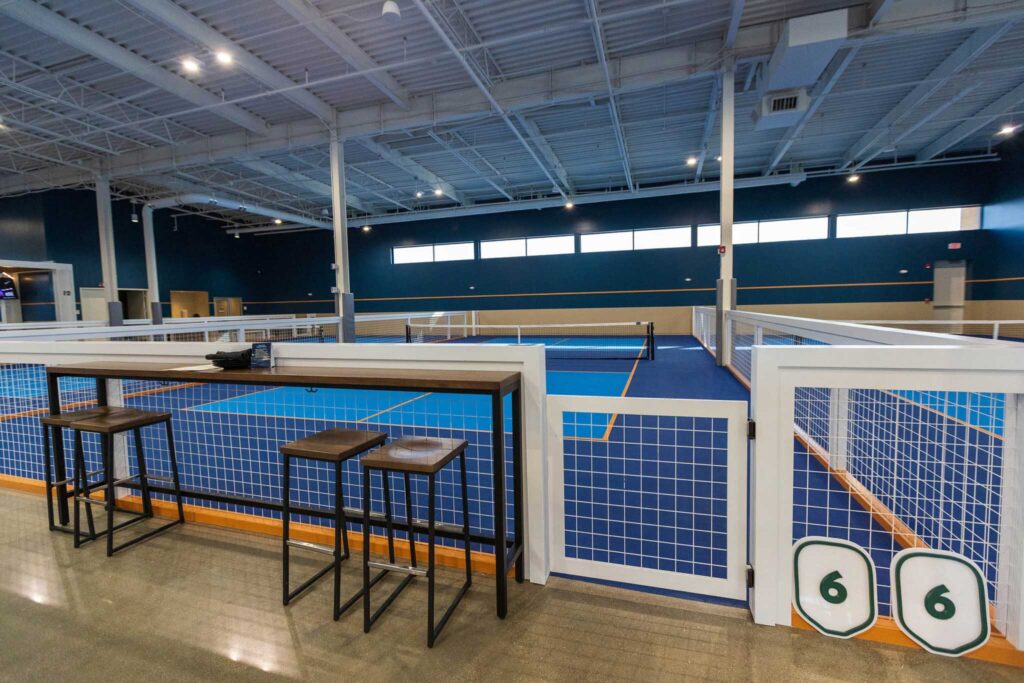
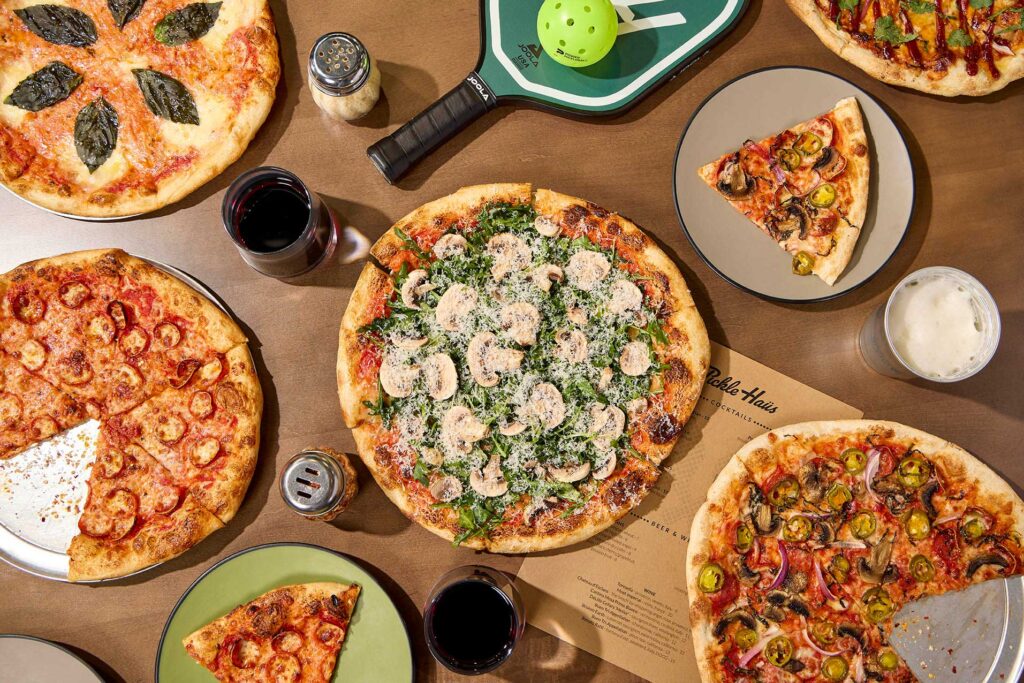
Do you guys have plans for other locations, or just the one at the moment?
We do. We’re in active talks with a couple other landlords for more locations in the Chicago area. But we really want to commit to getting the Algonquin location right and really getting our SOPs in line — knowing that any second, third or fourth location, we can hit the ground running and have some experience under our belt. Our growth strategy is admittedly a little slower than others, and that’s a stable growth strategy. But also, the building we require in order to accomplish our business model is different than even what other pickleball clubs might require, because of the restaurant and bar and event space demands that we’re looking for.
What would you say has been the most surprising thing about this new venture?
I think the most surprising is that this market continues to grow with no end in sight. Despite all the new players coming in, I don’t think we are even close to hitting the saturation point for the demand and excitement around pickleball. I think it’s surprising to see the way that pickleball brings people together like no other sport I’ve seen. It’s maybe the most accessible and inclusive sport for building community, which is one of the reasons it’s so popular and growing so fast. We meet people every week who’ve heard about pickleball but never dipped their toe in the water yet. We teach them the game for the first time, and all of a sudden, they’re hooked and playing five times a week. So again, I don’t think we’re even close to hitting the saturation point in the pickleball market, which is exciting.
Is there anything else you want to share about Pickle Haus or pickleball in general?
We take a lot of pride in our food and beverage program, too. More and more people are finding you don’t have to play pickleball to come to Pickle Haus. It’s a social gathering spot. It’s kind of a third space for some people who want to come just to eat, drink, have a good time and see other people being active and be part of that active community, even if they’re not participating. We have a chef-driven menu with all our ingredients from scratch, and we’re trying to provide a really premier experience in terms of the food and beverage program — in addition to top-notch courts and service as well.
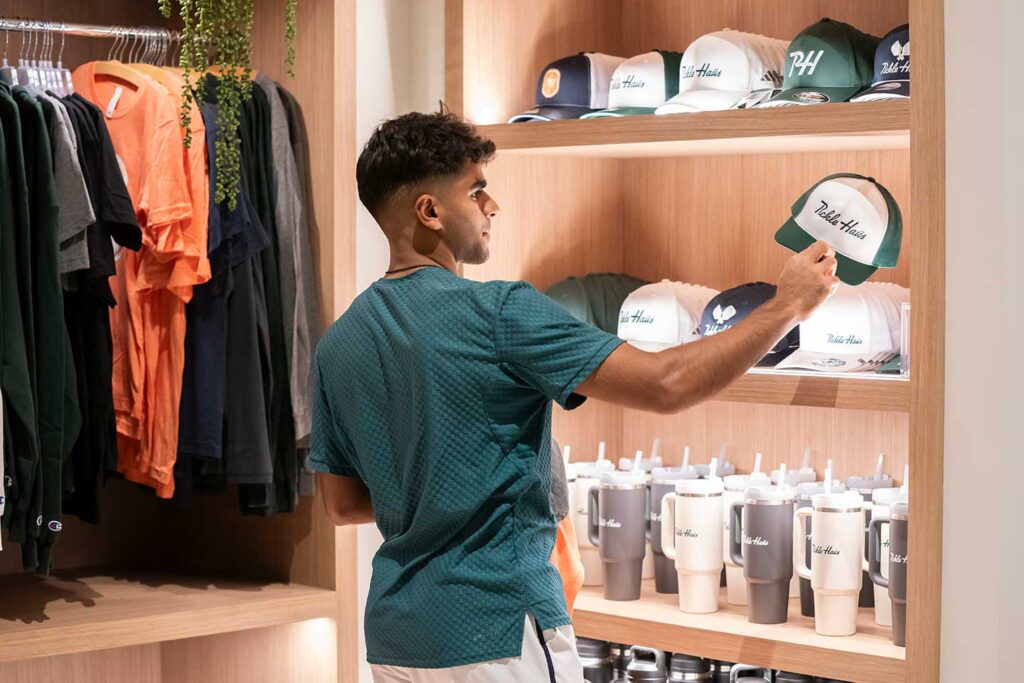
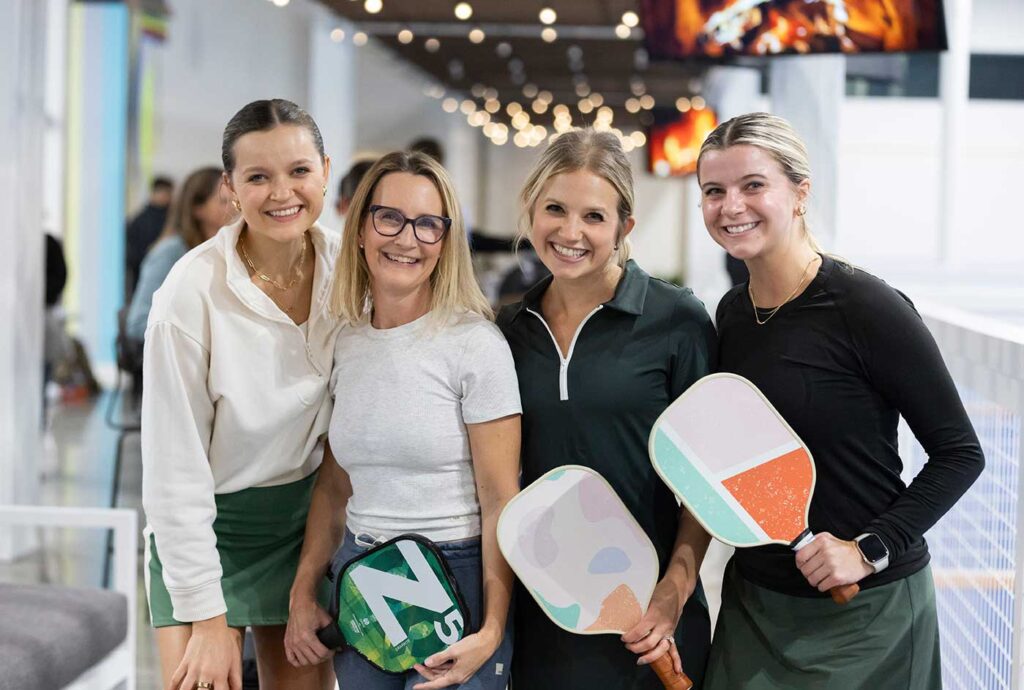
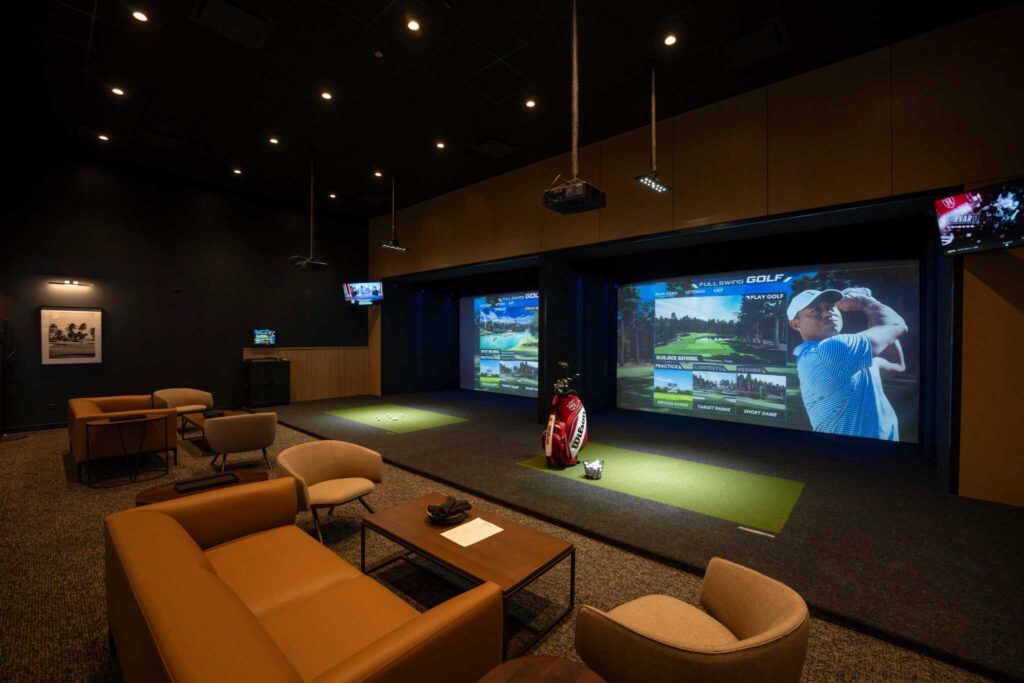
With over a decade spent covering the business side of sports and fitness, Rachel Chonko brings a wealth of experience and a true passion for active communities to Peake Media. As Editor-in-Chief, she’s focused on helping pickleball clubs and fitness facilities thrive, from guiding growth strategies to showcasing the latest industry trends. Rachel also hosts the Club Solutions Magazine Podcast, where she interviews leaders in fitness and pickleball to share insights and success stories with the wider community to give her listeners a competitive edge.
After taking up pickleball herself, Rachel has come to appreciate the sport’s unique blend of social connection and active living — a mix that’s perfectly in line with her editorial philosophy. Connect with her on LinkedIn, or check out her articles below for a deep dive into the energy and culture driving pickleball’s rapid rise.
